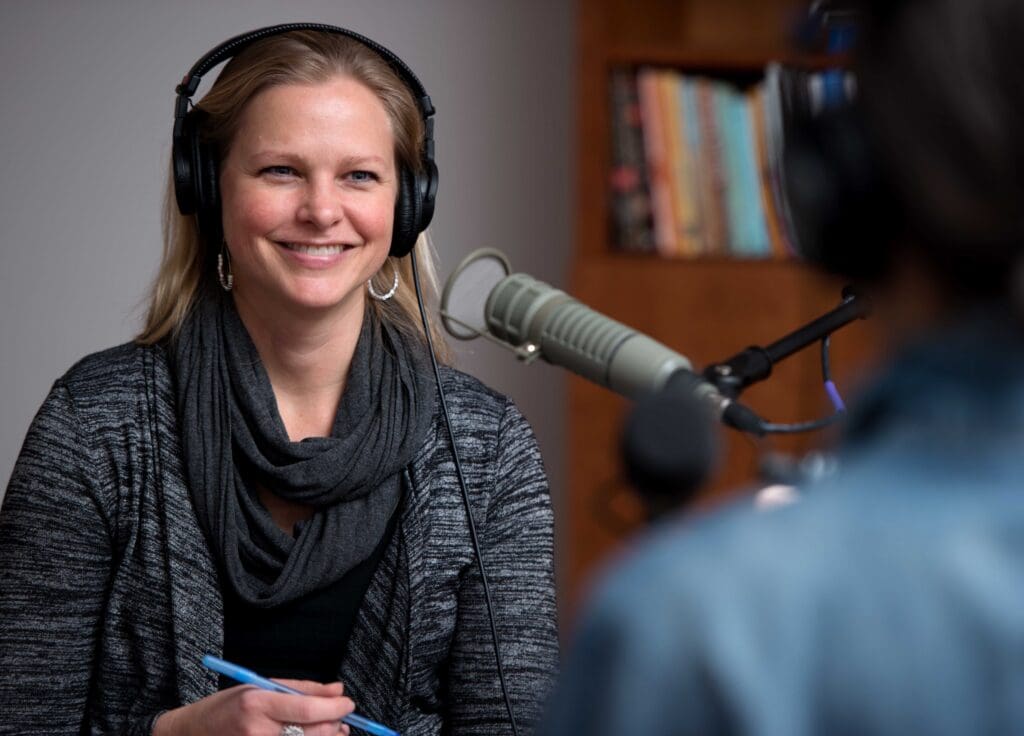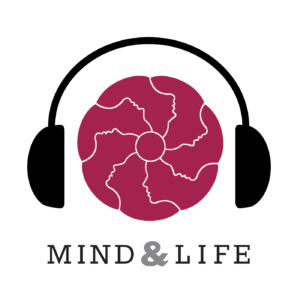In April, the new Mind & Life podcast will make its debut. Neuroscientist, meditator, and Mind & Life Science Director Wendy Hasenkamp will host the show, engaging experts across a range of disciplines in deepening our understanding of the mind and contemplative practice. Guests will share their research and insights, while probing broader issues: What are the most important applications of their work in domains like mental health, education, or social change? What trends are worth watching? What are the questions no one is asking?
Below, Wendy shares the origins of her interest in bridging science and contemplative wisdom, and gives podcast listeners a glimpse of what they can expect.

Since you’ll be guiding listeners through these conversations, can you share a little about the origins of your interests in science and spirituality?
I come from a family of engineers, so I always enjoyed figuring out how things worked. Science was an early love for me. Just playing outside in the woods or my backyard offered endless opportunities for investigation. At the same time, I was raised in the Christian faith, and took the spiritual side of my experience very seriously. The idea of God was ever-present for me growing up, and woven into my exploration of nature, biology, and the world around me. Science and spirituality were lenses I used to explain the world I encountered. And while my relationship to religion and my concept of God has changed considerably, the interweaving of these domains of inquiry has remained a driving force throughout my life.
What’s been your path in bringing together science and contemplative wisdom to understand the mind?
As a teenager, I was first exposed to psychology and the idea that our thoughts and emotions relate to chemical and electrical activity in the brain. This absolutely fascinated me—and still does. In college, I majored in biology and psychology, and went on to study neuroscience in graduate school with a focus on schizophrenia and psychiatric disorders. In those days, the spiritual dimension wasn’t integrated with the science at all for me, but I was reading and learning a lot about Eastern thought—yoga philosophy, Buddhism, Taoism—for my own personal development.
Toward the end of graduate school, I started meditating. Within a couple weeks, I could see results—in my demeanor, my reactivity, the way I related to my thoughts. As a neuroscientist, I knew something was changing in my brain. The idea piqued my interest, but at that time I wasn’t sure if, or how, it could be legitimately studied.
While undertaking a post-doc at Emory University, I came across people who were starting to study meditation and mindfulness. This drew me in; yet there was no community where conversations could happen. I started an informal seminar and invited people to come and discuss their ideas and research. It took off. People from diverse departments—nursing, psychology, anthropology, religious studies—now had a space to share their ideas and bridge what they were learning. The field of meditation research was brand new and wide open, so it was a really exciting time for all of us.
I was keen to get into this area of research more seriously and, in 2008, attended Mind & Life’s Summer Research Institute. It was an ‘aha’ experience. I felt like I’d found my academic home—a group of people who were interested in investigating the mind and possibilities for transformation. Afterward, I applied for and received a Varela Research Grant, which allowed me to conduct a brain imaging study on meditation and mind wandering. Eventually, a job opened up with Mind & Life and in 2012 I was hired. I’ve never looked back. While I’ve moved away from doing science day-to-day, now I can support these efforts from more of a 30,000-foot view and work synthetically across many fields.
What themes will you explore on the podcast?
We want to explore different perspectives on the human mind—how it works, how it can be changed, and why that matters. We realize that this inquiry can happen through many lenses—cognitive science, philosophy, anthropology, religion, social and clinical sciences, politics, art, and activism.
We’ll explore questions like, what is the mind? How are mental patterns created, maintained, and changed, and how does this affect our everyday lives? What are the effects of meditation and other contemplative practices in daily life and on human behavior? Why is the study of the mind important for society, for our larger world? Through talking with leading experts across a range of disciplines, we hope to arrive at a more integrated understanding of ourselves and our world, and how together, we can move toward collective flourishing.
We’ll explore questions like, how can the ways the mind is created, maintained, and changed affect our everyday lives? Why is the study of the mind important for society, for our larger world?
How do you hope the podcast will advance Mind & Life’s work?
Recently, we’ve been looking at how the knowledge within our broader Mind & Life community can be brought to bear to inform solutions to the crisis of disconnection in our world. Understanding the mind’s role in fostering connection will be key to humanity’s ability to survive and flourish as we face global challenges. Surveying Mind & Life’s history, it was clear that the conversations in our community and at our convenings offered a depth and richness about the mind not found elsewhere; yet often the insights didn’t reach far beyond the academic community. This, coupled with the fact that the media has a tendency to oversimplify and overhype the findings of contemplative science, made us think that we had something important and unique to offer. We recognize that if public understanding of the actual research is underdeveloped, it’s harder to impact larger systems.
The podcast offers a way to make this content more relevant and accessible to people, especially those involved in changing minds and behavior. When it comes to this kind of nuanced information, a conversation can be easier to engage with than a long article. We’re excited to give voice to people in our community doing critical work that we want to elevate.
We recognize that if public understanding of the actual research is underdeveloped, it’s harder to impact larger systems.
In a crowded podcast marketplace, what makes this show stand out?
My hope is to unpack the deeper story of contemplative science and what this field is all about. In terms of what’s out there, there are individual podcasts on meditation, cognitive science, and contemplative traditions like Buddhism, but none that talk about the integration of these, or contemplative research per se. Mind & Life’s work is distinguished by its longstanding interdisciplinary lens—the bringing together of multiple perspectives. We’re looking to introduce the people behind this work, the different approaches to investigating the mind, and the insights we’re learning. These are fascinating individuals advancing leading areas of inquiry. We want to give this science and scholarship a more human face, and explore its relevance for daily life and transformation.
Who do you seek to reach?
This show is for anyone who is interested in the mind and how it works, and why that matters. The conversations will go deep, but we’ll try to avoid getting overly technical. Our goal is to be accessible. A priority is providing insights to individuals who can apply this content in their work in the world, including researchers, mental health specialists, teachers, students, parents, and those working for social change. In addition, this will be a place where the academic community engaged in contemplative research and scholarship can expand their knowledge and encounter fresh perspectives that will inform their work.
Who are some of your inaugural guests?
We’ll be introducing the series with an inspiring slate of speakers. Thupten Jinpa, noted contemplative scholar, translator for the Dalai Lama, and Mind & Life board chair, will reflect on critical topics at the intersection of science and Buddhism. john powell, who directs the Othering and Belonging Institute at UC Berkeley, will share his perspective on the historical roots of ‘othering’ and pathways toward healing. Psychological anthropologist Tanya Luhrmann will elaborate on what she’s learned about the effects of spiritual practice on the way we experience the world. And Richie Davidson, founder of the Center for Healthy Minds, will share reflections on the field of contemplative science—where it’s come from and where it’s going. This is just the beginning. We’re fortunate to be able to tap into a range of leading-edge thinkers doing really pioneering work.
How do you hope your listeners—and the world more generally—will benefit?
A lot of the problems we see in society have some roots in the human mind, although these are often not discussed. Even issues like inequality that are perpetuated at structural and systemic levels are deeply related to mental constructs like ‘self’ and ‘other,’ and experiences like threat or fear, all of which are mediated by the mind. It’s more important than ever that we understand what’s driving our behavior, and how we can become more conscious of those drivers and how to change them. When it comes to addressing social problems, there’s a tendency to tackle surface-level symptoms rather than root causes. As an organization, if we’re going to address these larger questions around connection and well-being, we need to communicate the nuances of the mind’s role in the suffering that people experience.
It’s more important than ever that we understand what’s driving our behavior, and how we can become more conscious of those drivers and how to change them.
How can people learn more and subscribe to the podcast?

The podcast will be freely available on all the standard players (e.g., iTunes, Google Play Stitcher, Spotify), so listeners can subscribe through their preferred platform. To learn more, visit the podcast website, where we’ll post all episodes along with show notes and other resources like recommended reading. We’ll also be sharing each episode through our social media channels and the Mind & Life e-newsletter.

Wendy Hasenkamp, PhD
Podcast Host, Mind & Life Institute
Reviewer
Wendy is the host of the Mind & Life podcast, and former Science Director at the Mind & Life Institute. She is a neuroscientist, contemplative practitioner, teacher, and writer who … MORE

